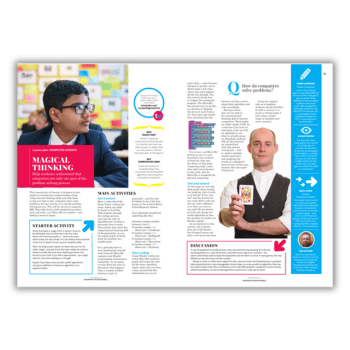Systems Management – What Does It Take To Run A Successful Computing Department?

Just taken over your school's computing department? Terry Freedman shares his top 10 tips for ensuring success from the start…

- by Terry Freedman
- Independent education technology consultant, writer and trainer Visit website

A school computing department differs significantly from any other in three main respects.
First, computing is a ‘new subject’ as far as the National Curriculum is concerned. Second, as a result of that your department will need to do some marketing in order to attract students at option time. And finally, technology and its associated issues are changing all the time, presenting you with the twin challenges of keeping up to date and spending your money wisely.
These considerations and others will hinge on how well the department is managed. If you want to ensure yours is the business, here are 10 things you should do…
1. Introduce self-evaluation
How can you judge whether or not you’re doing a good job of managing the computing department? One approach you might take is to formulate, with your team members, some Key Performance Indicators, or KPIs. Despite their association with corporate management procedures, they can be pretty down to earth. Some useful KPIs might include:
• Increasing the number of students opting to take Computing GCSE • Students indicating that they enjoy the subject • Staff feeling confident that they can teach the subject to a high standard
Note that these aren’t targets imposed by management or Ofsted – they’re criteria that you and your team set for yourselves.
2. Establish the department as a brand
Creating a brand suggests that you’re proud of what you have to offer, and is quite simple to achieve. Devise a logo – or better still, run a competition for students to design one – and then make sure it appears on everything the department creates.
When you or your staff attend conferences, equip yourselves with some business cards. These are very inexpensive these days, and definitely a good investment. I’ve often had teachers say to me at conferences, in response to my request for their contact details, “I’m not important enough to have a business card”. Make them feel important!
3. Create a departmental handbook
How do your new colleagues know what to do, who’s who, and where to go? A handbook doesn’t need to be long, but it will save new members of staff from having to ask questions of you and your colleagues all the time.
4. Share the load
Ask your colleagues to take responsibility for one or two units of the scheme of work. If each person produces all the materials for a six-week unit, it relieves the burden on everyone else — until it’s their turn. This helps for three reasons:
• Colleagues can plan when to be immersed in lesson preparation, instead of constantly battling to keep up • Each person will feel some ownership in the scheme of work, instead of it being something that’s done to them. • You’ll be amazed at how different people can make the subject come alive through using examples and approaches you may never have thought of
5. Share more of the load
Consider asking each team member to take on responsibility for one particular aspect of running the department. If, say, you’re not that technically minded about Wi-Fi but a colleague is, ask them to keep up to date on the latest Wi-Fi developments and advise you as appropriate.
6. Hold USEFUL meetings
We’ve all attended departmental meetings that could have been replaced by a memo, so make your meetings useful.
For example, spend a portion of your next meeting asking colleagues to update everyone else on developments in their particular area of expertise, as in the Wi-Fi example above. Discuss any issues arising with, to pick one example, an incoming new scheme of work. Consider also devoting portions of some meetings to moderating students’ work.
7. Keep records of meetings
Dead boring, this, and it will mean having to ask colleagues to take turns at taking minutes. However, these records will serve you well should Ofsted ask how you decided on a particular approach to assessment, for example – particularly if you can’t remember what was decided regarding [X] months beforehand.
8. Introduce common procedures
I firmly believe in giving staff a lot of autonomy, but there are some aspects of life that consistency makes easier. A good example would be to develop a departmental policy on marking.
9. Keep on top of your finances
Maintain a simple spreadsheet of where your money is going. If you use Excel, you can employ the ‘SUMIF’ function to tell you which types of spending are accounting for the largest proportion of your outgoings.
10. Keep a CPD record
Maintain a simple document or spreadsheet showing who went on a course, when, and what the course was about.
Not only will this help you develop a good balance of skills within the department, it will also help you argue your case should you need someone to attend a conference or the Bett show.
Even if you find the subject of computing challenging, you can run a good department by introducing procedures, utilising the strengths of your team members, and continually monitoring its performance.
Terry Freedman is an independent educational ICT and computing consultant; for more information, visit www.ictineducation.org or follow @terryfreedman










